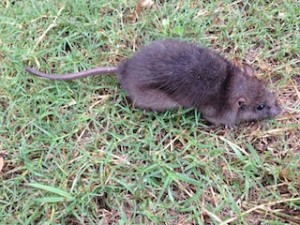Rats can reach sexual maturity at 5 weeks of age
Rats don’t have a breeding season
Females of breeding age come into heat all year round, every 4 to 5 days
WOW! When on heat a female rat can mate around 500 times with different males, in a six hour period
A pair can produce as many as 2000 descendants in a year
Average lifespan is 3 years
Rats don not recognize incest
The gestation period is normally 22 days
Rats’ front teeth grow 4½ to 5½ inches each year
Rats eat their own feces, purely for the nutritional value.
A rat can fall as far as 50 feet and land uninjured.
A rat can jump 1.5m horizontally and .75m vertically
Rats are known to transmit several potentially fatal diseases to humans, including: viral hemorrhagic fever, plague, Weil’s disease, and Q fever.
A mouse in the house isn’t as cute as it sounds. Rats in the roof are worse! Rodent pests spread disease, cause, damage and create odours. Finding those telltale droppings in the pantry cupboard means:
1) a huge clean out, and,
2) you need to stop the problem quick smart before it multiplies. Rats and mice often inhabit wall and roof cavities. Their urine can cause allergic reactions and they may carry fleas, lice, mites and ticks into your home. They can chew electrical wiring, causing fires.
The solution:
Trim trees back to beyond 2m of house/roof gutters. Trees touching your building also bring ants and spiders inside.
Reduce food, water and harbourage for the rodents. Pet food, chicken food etc. should be stored properly and distributed to your pets without waste or spillage. Sheds, garages, or storage areas packed to the rafters with stored boxes or other goods, can provide a breeding ground for rodents. Mulch piles and garden waste also provide breeding space. Compost bins should be sealed tightly. Quiet sheltered areas (such as roof voids) provide excellent breeding spaces.
It is nearly impossible to rodent proof most buildings. A full-grown rat can squeeze through a 10mm squared hole.
Act quickly before the problem spreads. Mice and rats breed FAST!
Call us at the first sign of rodent visitors.
Call: 0411 225 958,
or free call


